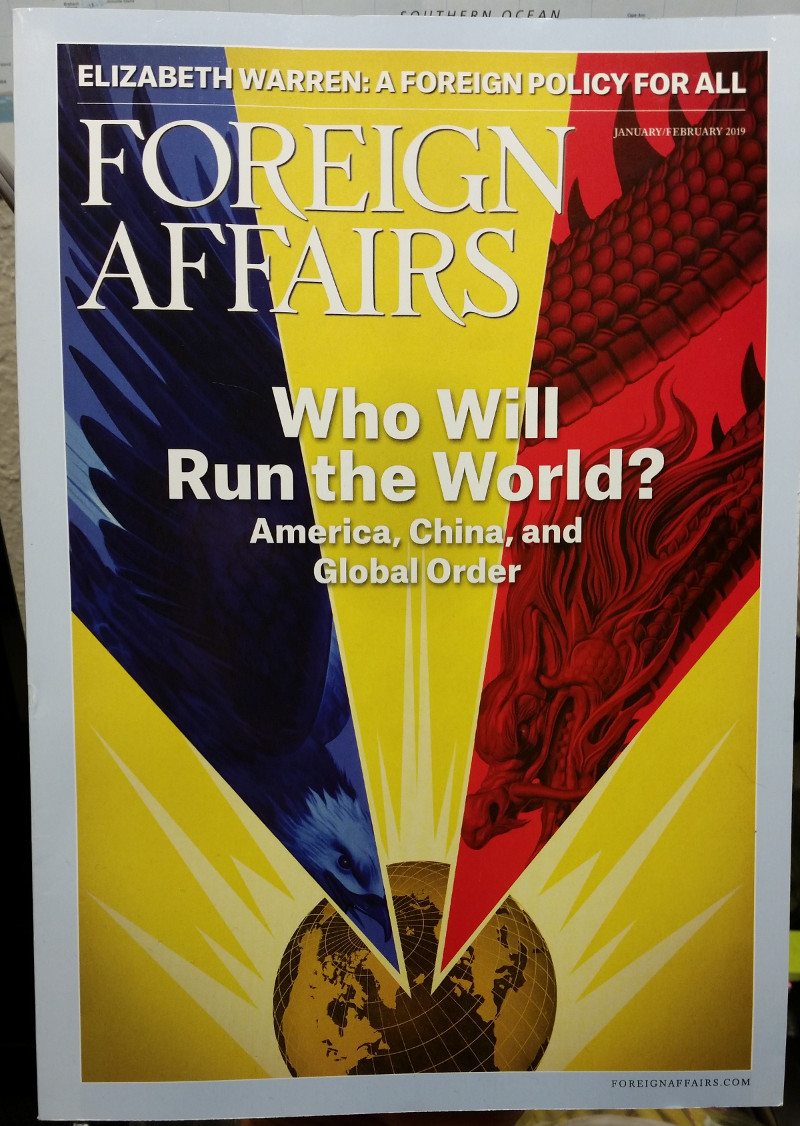
Noted recall: The goal is to describe, in just a few words, what the article is about. Additionally, if I think the article is particularly note-worthy (good or bad), I will comment on that. Compare this to a small sticky note, something to jog your memory about the contents of an article. Of course, if I miss the point of an article, or fail to find anything remarkable, that is entirely the fault of the reviewer.
Available at: https://www.foreignaffairs.com/issues/2019/98/1

The Fourth Founding - Gideon Rose
(read 2018/12/17)
Mostly historic article about America and liberal world order. Starts with WWI, then WWII, and the cold war. Suggests we are at another critical point in history with the rise of populism and autocratic tendencies in established democracies.
How a World Order Ends - Richard Haass
(read 2018/12/17)
This article spent a lot of words to say that the US (but other countries too) needs to improve existing alliances and foreign relations, drawing a parallel to Europe at the end of the 19th century. The implication is that WWI resulted, though we are still a long ways off from something similar.
The Stealth Superpower - Oriana Skylar Mastro
(read 2018/12/20)
Discusses China's growth and plans for the future. It seems China's plan is not to replace the USA as a global superpower, but to displace it as a regional leader in Asia. China has, for the most part, preferred economic power and been cautious to challenge on military grounds.
The Age of Uneasy Peace - Yan Xuetong
(read 2018/12/20)
Echoes previous articles. We're drifting towards a bipolar US-China world, but there won't be another cold war.
A Foreign Policy for All - Elizabeth Warren
(read 2019/01/07)
Standard article about decline of global democracy, decline of USA as global leader, rising inequality, rise of authoritarianism, need to do something better.
The Eroding Balance of Terror - Andrew F. Krepinevich, Jr.
(read 2019/01/07)
Author says deterrence was more useful in the Cold War era of a bipolar world. Focuses on nuclear weapons, suggests multipolar world creates imbalances that lead to escalating nuclear stocks. Also mentions that less "immediate" (my paraphrase) assets like undersea cables or satellites mean pre-emptive strike is less costly (to the aggressor). Cyber security is a similar example, attacks and counter-attacks do not have the same costs as physical invasion. Therefore, deterrence is diminishing. Worth mentioning the author points out some minor updates to prospect theory that go into deterrence calculations.
How Congress Can Take Back Foreign Policy - Brian McKeon and Caroline Tess
(read 2019/01/08)
Suggestions for the new congress and the Democratic House. House Democrats should hold hearings; can guide committee agendas, like the House Foreign Affairs Committee (discuss Iran and North Korea) or the House Oversight and Government Reform Committee (investigate Trump family business). The House is more able to include Democratic amendments into new legislation now.
America's Middle East Purgatory - Mara Karlin and Tamar Cofman Wittes
(read 2019/01/08)
That US policy seems to want to do less in the Middle East, but can't commit. Middle East is less of a policy focus, due to rising importance of other areas, mainly China; but also due to decline of reliance on oil. But simply having a presence affects how allies might interact with other countries. And also, retreating from the Middle East will probably see an increase in unfriendly presence (China; Russia) in the area
The Crisis of Peacekeeping - Séverine Autesserre
(read 2019/01/09)
Informative article on UN Peacekeeping. Discussion of limitations, such as foreign soldiers holding stronger allegiance to home country than the deployed UN mission. Small commitments from host countries could be increased. A look at policy execution, which is ineffective because it focuses on a policy described remotely with little customization. Instead, the focus should be on community led initiatives with only assistance (administration; funding; expertise) being provided by the UN.
The Free-Trade Paradox - Alan S. Blinder
(read 2019/01/09)
Short article on public perception of free trade and trade agreements. Some reason why protectionist policies are popular, and some possible policy changes or political actions to explore.
Trump Versus the Government - Elliott Abrams
(read 2019/01/09)
I stopped reading when the author said Trump's Russia policy was tougher than Obama's.
America's Long Goodbye - Eliot A. Cohen
(read 2019/01/09)
Rather short article. Some comments about the current administration mostly continuing the status quo in foreign policy. But Trump has accelerated (not being the entire cause) of America's retraction and decline as world leader.
Deepfakes and the New Disinformation War - Robert Chesney and Danielle Citron
(read 2019/01/09)
Introductory article to synthetic video technology. Brief mention of historic propaganda. Assumes that fake videos will have serious negative consequences for society. Some discussion on fake detection, and including proof of authenticity in legitimate media. Disappointed -- but not unexpected -- that the authors didn't explore other aspects.
The Unhackable Election - Michael Chertoff and Anders Fogh Rasmussen
(read 2019/01/09)
Some background on recent electronic election meddling such as online bot influence in social media. This is given to explain the need for a new organization, being introduced in this article, the Transatlantic Commission on Election Integrity.